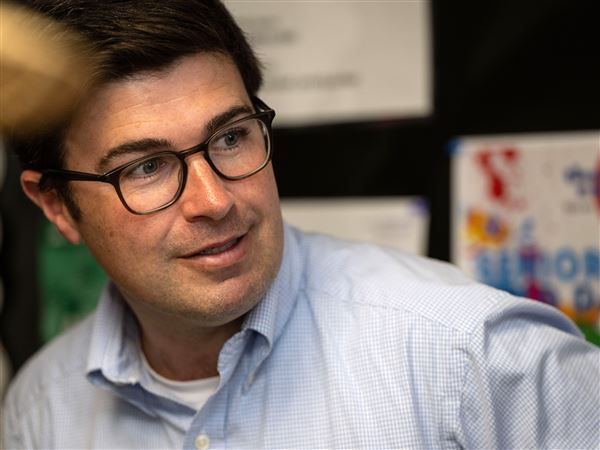The Facebook page seeking justice for Lauren Deis, the 14-year-old East Liberty girl who police say was raped and killed by a 35-year-old convicted sex offender, features links to AdultFriendFinder, "The World's Largest Sex & Swinger Personals Community."
A Facebook group supporting Joncarlo Patton, the South Fayette teen accused of slitting his mother's throat in India, was spammed by users' tasteless puns on the slaying: "It's so sweet how everyone puts they're heads together to support this kid:)"
And on a page remembering Latrobe's Joe Dado, who fell down a staircase and died during his first month at Penn State last year, is a message typed in all capital letters from a user masquerading as the deceased infomercial pitchman: "Billy Mays Here! Tired of always falling down stairs and breaking your neck? Then you might want to try my groundbreaing new product, the Mighty Stairgrippers ..."
The postings may be morally repellent -- but they also are perfectly legal.
It's tough when moral ambiguity meets a world of algorithm.
"The Internet has turned over the rock," said H. Brian Holland, a law professor and digital media expert at Texas Wesleyan School of Law. "And once we've turned over the rock and see what's underneath, how does society react?"
Academics and prosecutors are reacting by re-examining legislation that safeguards Internet companies from being held responsible for user activity.
Pittsburgh's examples are similar to others across the country. High-profile cases of cyber bullying and testimony before Congress by Craigslist executives have thrown into the spotlight a 14-year-old piece of legislation: Section 230 of the Communications Decency Act, which grants immunity to sites for content posted by users.
When Section 230 was written in 1996, the founder of Facebook, Mark Zuckerberg, was in sixth grade, and AOL Internet came courtesy of a CD-ROM that arrived in the mail.
The Web that's evolved since then has an anonymity that allows "skinny-dipping in a public pool," said Mr. Holland.
The unfettered environment leaves top tech companies balancing the appeal of an unfiltered community with the risk of malevolent activities by a minority of users.
Craigslist recently came under fire when a coalition of state attorneys general targeted the site's "adult services" category, which ran ads that the prosecutors likened to an eBay for prostitutes. The ads cost $10 each and were expected to generate $44 million in revenue for Craigslist this year.
In response, the company replaced the section with the word, "Censored," a move interpreted by some to be a tongue-in-cheek ploy by the company to temporarily appease its critics. But executives told Congress last week they had no plans to reinstate the category.
The acquiescence of Craiglist executives was a blow to Section 230, which allows prosecutors to go after pimps who post prostitution ads on Craigslist but not after Craigslist itself.
"The law may let Craigslist do it, but that doesn't mean people will like it," said Eric Goldman, director of the High Tech Law Institute in Santa Clara, Calif.
"Some sites definitely use [Section] 230 as an all-encompassing shield or an excuse to do nothing," he said. "But most major Web 2.0 companies tend to be more involved with user content than legally required."
Usually some form of intervention is required just to keep the site in business. Otherwise, a site risks allowing nefarious users, or "trolls," to overwhelm the site and drive away other users -- a form of virtual eugenics, said Mr. Holland.
One example is the AutoAdmit message board, which began as a forum for law school applicants but soon dissolved into a virtual town hall of hate and defamation. Eventually, everyone but the trolls left.
Mr. Holland defends Section 230.
"Some of the egregious cases are difficult to swallow," he said. "But if you were to hold Google responsible for everything that went across their line, they would be shut down in 24 hours."
The sheer volume of Web traffic would be too much for anyone to police, and Section 230 allows the quick processing of all information -- of which the offensive remarks are only a fraction, said Mr. Holland.
Though testimony before Congress recently saw changes in Craigslist policy, it doesn't look like the government plans to step into the debate any time soon.
In an e-mail, Facebook spokesman Fred Wolens said his company has a team of professional investigators who look into flagged content but leave comment maintenance to community administrators who can delete comments or kick people out.
"The goal of these policies is to strike a very delicate balance between giving people the freedom to express their opinions and viewpoints -- even those that may be controversial to some -- and maintaining a safe and trusted environment," he said.
In an attempt to maintain civility on their pages, many users draft their own guidelines for the group.
The "Rest in Peace Lauren Deis" site includes this directive:
"Rules and Regulations: Racism; curse words; unnecessary and rude name calling; or offensive language is not tolerated.
"If i read any comments with any of the above i will 1.) give you a warning
" -then- 2.) ask for you to be removed from the page 2a.) if you are uncooperative you will be banned (for good)
"Thank you for your time!"
In other cases, individuals step forward to monitor the discourse.
Kelly Sham, a mother from the North Hills, heard about the Joncarlo Patton case from a friend and joined his supporters' group, straying from her usual Facebook activity of only talking with friends and family. When she read the weird, sexual comments, she said she thought, "Maybe this kid's grandmother is reading this."
"I would look at it and read things and the more I read, the angrier I got," she said. "I shouldn't say angry. I should say offended, offended for his family even though I don't know them."
Ms. Sham began calling out the attackers, telling them to go away, that this was a page for friends and not name-callers, to "go stand on your soapbox somewhere else!"
She doesn't think of herself as a vigilante, just someone trying to enforce common decency after having been there herself.
"My sister died years ago, before there was Facebook, and I'm actually glad there was no such thing then," she said.
First Published: September 19, 2010, 4:00 a.m.















